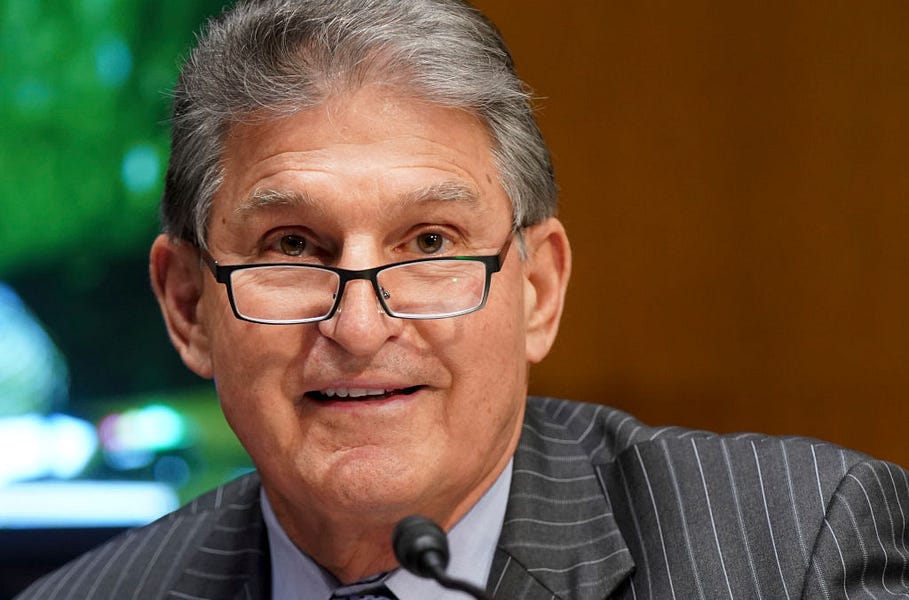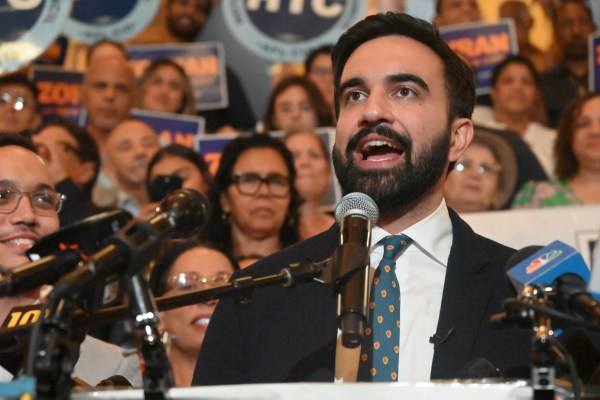It’s official: In the great existential battle between a return to normalcy and a new progressive era, normalcy is winning.
Recall that Joe Biden ran as a moderate in 2020, not just in the general election but also in the Democratic primaries. Biden triangulated off the Bernie Sanders and Elizabeth Warren wing of the party, rejecting “defund the police,” “Medicare for All” and the socialist label. In general, he did everything he could to reassure voters he wasn’t the caricature radical the Republicans tried to paint him as.
And then victory went to Biden’s head.
You could see it happen in real time. Biden’s $1.9 trillion COVID-19 relief package was very popular, including with many Republican voters, and the congressional GOP offered little to no meaningful resistance to it. This gave the White House—and the progressive pundits pushing Biden to “go big”—the false impression that the rest of the Biden agenda would be equally popular. (It turned out that being sent large sums of cash with no strings attached is more popular than the more conventional Democratic fare.)
Also, Democrats took two Georgia Senate seats in a post-election runoff that likely would have gone Republican but for Donald Trump’s “stop the steal” chaos. If Republicans had taken even one of those seats, they would control the Senate. Instead, Democrats suddenly had unified control of Congress.
Finally, on March 2, a group of liberal historians told Biden he had a shot at being a new FDR or LBJ and should go for it.
The only problem with all of this is that it was fatally detached from political reality. FDR and LBJ won landslides, had huge majorities in the House and Senate, and had considerable support from Republicans as well.
Biden had the narrowest majority possible in the Senate and very close to that in the House. His presidential coalition wasn’t merely small by comparison, it was also arguably more divided. A significant number of his voters cast ballots against Trump more than for Biden, which is why the GOP actually picked up seats in the House.
Worse for Biden, several Democratic senators, most notably Joe Manchin of West Virginia and Kyrsten Sinema of Arizona, aren’t on board for a new New Deal or new progressive era.
Last week, Biden came close to admitting that reality wasn’t getting his back.
“I hear all the folks on TV saying, ‘Why doesn’t Biden get this done?’” he said, referring to himself in the third person. “Well, because Biden only has a majority of, effectively, four votes in the House and a tie in the Senate, with two members of the Senate who vote more with my Republican friends.”
That last dig at Sinema and Manchin was unfair. What they won’t do is vote to abolish the filibuster, which would let the Democrats steamroll their agenda with 50 votes.
The problem for Biden is he has an agenda that would be plausible with 60 reliable votes in the Senate but is impossible when he has to scramble to get even 50.
That harsh reality became clear over the weekend, when Manchin announced in an op-ed that he would not vote for the For the People Act, which would radically federalize the way we conduct elections.
The Democratic base thinks this is largely a Manchin problem. New York Rep. Jamaal Bowman told CNN on Monday that “Joe Manchin has become the new Mitch McConnell. … Joe Manchin is doing everything in his power to stop democracy.”
Rep. Mondaire Jones of New York indefensibly tweeted that Manchin’s op-ed might as well be titled “Why I’ll vote to preserve Jim Crow.”
Overlooked in this backlash is that Manchin is actually taking heat for other Democratic senators who can’t afford to be as out front as Manchin, who comes from a solidly Republican state. (Trump won West Virginia by 39 percentage points.) Progressive activists want to oust Manchin and Sinema in favor of more pliable team players. “Help us find the next AOC to replace Manchin and Sinema” was how one progressive PAC positioned its strategy in February.
This is unhinged from reality. Manchin is almost surely the only Democrat who can get elected in his state. He’d beat a West Virginian Alexandria Ocasio-Cortez handily, and if he didn’t, a Republican would in the general election. You can have a centrist Democratic senator from West Virginia or no Democratic senator at all.
This is what normalcy is supposed to look like: two parties trying to figure out how to win over the center. And it’s long overdue.







Please note that we at The Dispatch hold ourselves, our work, and our commenters to a higher standard than other places on the internet. We welcome comments that foster genuine debate or discussion—including comments critical of us or our work—but responses that include ad hominem attacks on fellow Dispatch members or are intended to stoke fear and anger may be moderated.
With your membership, you only have the ability to comment on The Morning Dispatch articles. Consider upgrading to join the conversation everywhere.